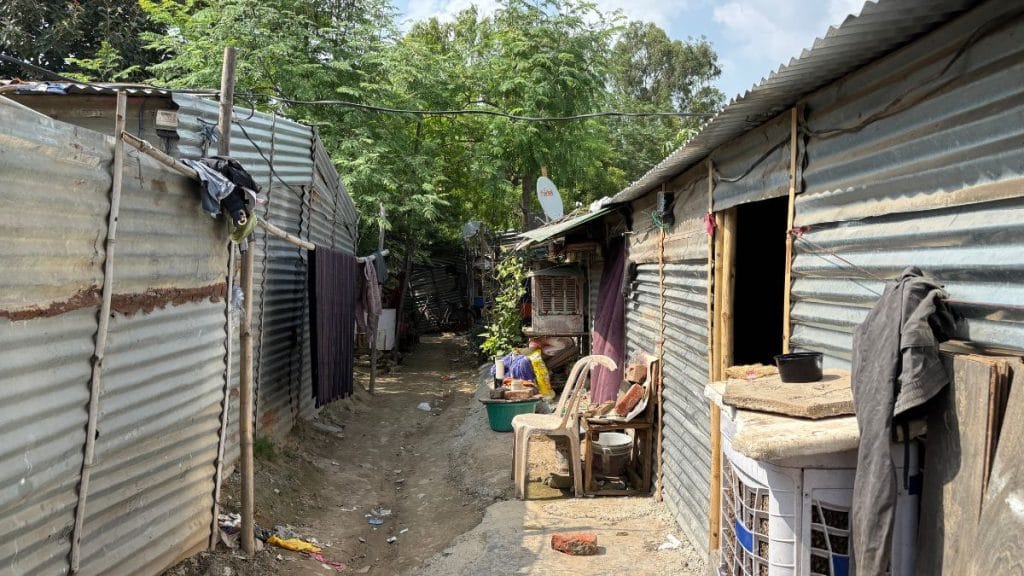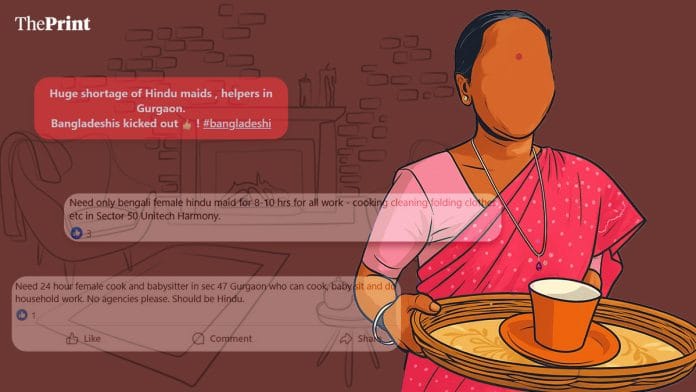Gurugram: Neha Chaudhary is having a hard time convincing any cleaner to work at her apartment in Sector 70A. Every candidate wants more money, shorter hours, and two weekly holidays. Some say her house is too big. And she has her own new non-negotiable condition: the worker must be Hindu.
For Chaudhary, it isn’t about ‘communal’ preferences. It’s risk management in the wake of the exodus of Bengali-speaking Muslim domestic workers after Gurugram’s police verification drives.
“I had Muslim maids earlier. Now, there isn’t a single one around. And the Hindu maids are throwing a lot of tantrums — they know we’re in a vulnerable position and will eventually give in to their demands,” said Chaudhary, who developed vertigo a week into managing all the household chores herself.
Such is the emergency that she, like many others, is willing to pay the revised rates in her neighbourhood— Rs 2,500 just for cleaning and Rs 3,500 for cooking, up from Rs 1,500 and Rs 2,500 earlier.
Gurugram is searching for an elusive figure: the Hindu domestic worker. Residents of upscale, glittering high-rises are willing to pay more on one condition: the staff must be Hindu, local, and vetted. The informal labour market in Millennium City has gone into free fall after police crackdowns aimed at identifying Bangladeshi nationals for deportation were conducted between mid-July and early August. The drive triggered widespread fear, with vigilantes and mobs demolishing shanties, sending droves of Bengali-speaking Muslim workers — cooks, dog walkers, car cleaners in the city’s gated republics — onto trains back home.

Now, reality is sinking in for Gurugram’s residents. The panic is visible online. Instagram and Reddit are full of posts about the low supply. On Facebook, a bright red post announced: “Huge shortage of Hindu maids, helpers in Gurgaon… Bangladeshis kicked out.” Communal hiring has always been part of India’s domestic labour market. What’s new in Gurugram is the practical calculation that it’s better to hire a Hindu than risk employing someone who might be deemed “Bangladeshi”.
“Need only Bengali female Hindu maid for 8-10 hrs for all work,” read one 23 August listing from Sector 50’s Unitech Harmony. Another from Sector 47 sought a babysitter — “should be Hindu.”
And long underpaid and overworked domestic workers are making the most of this new-found demand and the power that comes with it. It’s like a scene out of the film Triangle of Sadness, where a luxury cruise sinks and the ultra-rich are stranded with a staffer — the only one who can cook, clean, or survive. With the roles reversed, it’s the worker who starts calling the shots.
In one RWA group, a resident indignantly recounted how she’d overheard two Hindu domestic workers planning to go on “strike” if they didn’t get a bump in pay. The employer urged proper reference checks, otherwise the newly in-demand Hindu workers would go on “fooling” residents.
In desperation, more and more residents are relying on domestic service apps such as UrbanCompany, Pronto, and Broomes for per-day cooks and cleaners. The prices are relatively steep to begin with and now, here too, there’s a Hindu premium.
“Most new orders have been from Sectors 45 to 61, where Bengali Muslim workers used to live,” said Saurav Kumar, founder of Broomees. “Customers there began explicitly asking for Hindu workers. In several cases, even Hindu Bengali workers left out of fear. We had to rope in workers from Chakkarpur, and they started asking for more. So we raised prices.”
Also Read: Gurugram police ask for Bengali migrants’ passports. They say ‘we haven’t even seen a train’
Ripple effects
Manan Verma’s day turned upside down a few weeks ago when he received three phone calls in quick succession — from his househelp, cook, and car cleaner. Each delivered the same message: they wouldn’t be coming to work.
At work, crestfallen colleagues came with the same story. Many were ordering food instead of bringing packed lunches. Some had arrived late; others had taken the day off. Everyone had the same complaint — their domestic help had suddenly disappeared.
“That’s when I Googled to find out the reason. My internet search told me it was the eviction of Bengali Muslim migrant workers behind this,” said Verma at his desk in the Sector 50 office.
This prompted Verma to create a video on the ‘Gurugram maid crisis’. Dressed in a cap, neon green t-shirt, and shorts, he recorded it while on his morning run and posted it to Instagram
I don’t have to scrub utensils all day long now. I told my employer I’ll be taking tea breaks and days off too. I’ll work at these two houses, come back home, and spend time with my lalla (child)
-Radha, domestic worker from Jharkand
“I don’t know why nobody is talking about it, but Gurugram is sitting on a major maid crisis right now… “Domestic help prices have shot up by 50 per cent,” he said in the video.
It immediately struck a nerve, drawing over 11,000 likes, about 950 comments, and 13,500 shares. It tapped directly into an unease already simmering across RWA WhatsApp groups and park bench conversations.
The situation especially affected working women, given the patriarchal gender divide in most households.
For Verma, who lives in Sector 50, the crisis became more personal when his mother, a retired Delhi University professor, told him she was unable to keep up with the household chores.

Neha Chaudhary, a Zumba instructor, was already struggling to manage household chores herself when her cook and cleaner, both Bengalis, left in a rush. Now her own work is affected. Women have started dropping out of the classes because the time they used to give to Zumba has now been taken up by household work.
“The other day one of my Zumba students said that the way it is going without house helps, she will not only have to leave Zumba classes but also work,” said Chaudhary.
The last time there was such a domestic work “crisis” was in the height of the pandemic but now, as then, the onus is falling on the wives and mothers.
Thirty-eight-year-old Sunita, works at an MNC and lives in Sector 40, said she’s now responsible for cooking, cleaning, washing utensils, and getting her child ready. Her househelp Karishma left two weeks ago and her phone is switched off. Now, like others she is on a hunt. Meanwhile, her husband, who has been working from home since COVID, stays glued to his laptop in the other room.
“House helps were our saviours, at least for women. We had our lives outside household work. We have really understood their importance now,” said an exasperated Sunita.
Atmanirbharta, ‘national security’ divide residents
The domestic labour shortage hasn’t just disrupted routines. It’s also exposed ideological fault lines in Gurugram’s condos. It has divided residents into camps on two fronts — ‘national security’ vs convenience as well as dependence vs atmanirbharta.
In a DLF 2 RWA group, when one participant criticised the eviction drives, another shot back: “Do you hire Bangladeshis?” There were also digs at people suddenly becoming “liberal” because they had lost their dog walkers.
The backlash goes both ways. Verma’s Instagram video attracted its own fair share of critics. Some objected to his choice of words. “First, don’t call them maids. Give them some respect. Call them househelp,” read one comment. Another said it wasn’t a “maid crisis” but a crisis of “segregation and discrimination.”
The demand suddenly surged in August… We added another layer of verification in our service app for the workers. We asked for more documents, other than Aadhaar card. And started charging more as well because these Hindu workers were coming from far flung areas and, hence, we had to cover their transportation charges as well
-Saurav Kumar, founder of Broomees
Some refuse to hire on religious grounds.
“My cook was asked to evict her house. She was a Christian Bengali. For us people work speaks for itself not identity,” said city social activist Ruchika Sethi. She recounted that her cook told her in a late-night message that all Bangla-speakers in a Tigra village building had been evicted by the landlord.
Now, some have even hired back Muslim workers who had left for their villages and later returned.
Megha Sen, a resident of DLF 2, hired back her Muslim domestic help after the worker went to her village to get the appropriate papers post the police drive. Sen reassured her that the job would be waiting for her.
“This is a girl of 19 or 20. She wanted to know if she should come back, and I said yes. She returned after a month. If someone is a Bangladeshi, they have no business staying in the country illegally. But if it’s an Indian citizen, their religion, Hindu or Muslim, doesn’t matter to me. Every citizen has the right to be employed without discrimination.”

But many employers say it’s not worth the risk. On a Reddit post about the vanished workforce, one commenter warned: “All those who are in favour of illegal workforce or helping them hide just for the sake of their own convenience should also be reported to the police. Nothing is above the NATION and NATIONAL SECURITY.”
Another point of friction is the idea that this crisis has exposed just how reliant the upper middle class is on hired labour. Laments and ‘help wanted’ ads are rife with hectoring comments about the need to be ‘atmanirbhar” and the importance of knowing skills such as cooking, especially when abroad.
Still, beneath the online finger-wagging is an unspoken truth many acknowledge: the Indian family system stands on the bedrock of someone else doing all the cooking, cleaning, laundry, and other sundry tasks.
“Half of the marriages are functional in India because of maids and cooks,” said one of the comments on Verma’s video.
Also Read: First chips & condoms, now domestic workers in 10 mins. Apps pull strings, consumers rule
Cashing in on the ‘crisis’
For service apps such as Broomees, August has been a month of windfall gains with thousands of new signups from desperate residents.
“The demand suddenly surged in August. We were astonished,” said founder Kumar.
But residents were now more picky. They wanted Hindu workers with papers in order. A guarantee that they were staying legally in Gurugram. Meeting those stipulations raised prices, according to Kumar.
“We added another layer of verification in our service app for the workers. We asked for more documents, other than Aadhaar card. And started charging more as well because these Hindu workers were coming from far flung areas and, hence, we had to cover their transportation charges as well,” he said.
Under normal circumstances, the app charged Rs 5,000 for cooking for two people. Now the price has jumped to Rs 7,000 for the same work.
Fitness enthusiast Verma also initially turned to an app, Pronto, for cleaning the house. The charges shook him: Rs 800 for cleaning just three rooms.
Hindu maids are throwing a lot of tantrums — they know we’re in a vulnerable position and will eventually give in to their demands
-Neha Chaudhary, Gurugram resident
“This was the discounted price after applying coupons. It was still quite expensive for us,” said Verma, who, like many in Gurugram, doesn’t remember the names of the workers who once came home daily.
Over the next two weeks, he kept booking through apps. But he realised it wasn’t feasible to manage daily chores this way. That’s when the rigorous hunt for a regular domestic worker began. Verma dropped messages in RWA WhatsApp groups, where almost every resident was lamenting the same problem. He called friends, checked social media groups, and began what he calls “human referencing”— networking with domestic workers.
“The house helps who came through the app — I asked them if they knew anyone who could work here, or if they could take up the job themselves,” he said, casually checking the views on his latest Instagram video.
That’s how he found the right fit: Hindu and vetted, even if overpriced for his pocket.
Ten kilometres away, in Chakkarpur — a hotspot for Hindu domestic workers — Radha is smiling ear to ear. She has just landed two new cooking jobs in a condominium, each paying Rs 8,000.
“I don’t have to scrub utensils all day long now,” she said. “I told my employer I’ll be taking tea breaks and days off too. I’ll work at these two houses, come back home, and spend time with my lalla (child).”
Radha, who is from Jharkhand, is revelling in the fact that the tables have turned. With a smirk, she said: “Ab aaya oonth pahad ke neeche. Bahut tang kiya tha inn logon ne humein”— Now the camel is finally under the mountain. They had troubled us long enough.
(Edited by Asavari Singh)







Paying just 3k for cooking? If true, that’s way too low and sounds like exploitation. In Chennai, even a year before, the ‘nominal’ rate for a cook (for cooking one meal and a simple b.fast or dinner) was minimum 9k..most good ones demand more. Our cook, who was taking 10k plus, wanted 15k and stopped coming!